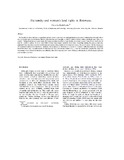| dc.description.abstract | Patriarchy has been defined as a gendered power system: a network of social, political and economic relationships through which
men dominate and control female labour, reproduction and sexuality as well as define women’s status, privileges and rights in a
society. Taking Botswana as a case study, this essay examines the effects of patriarchy on women’s access, control and ownership of
land in southern Africa. It notes that while women were largely excluded from land ownership during the pre-colonial era,
patriarchy has since been selective on the type and nature of land rights that women may enjoy. The essay argues that the weakening
of traditional patriarchal structures, attitudes and practices in Botswana is a result of women’s self-empowerment, economic
transformations and the replacement of chieftainship with democratic institutions. It ends by noting that despite the apparent
weakening of pre-colonial institutions and attitudes, there have emerged new forms of female subordination, which require vigilance
and constant exposure. | en_US |

